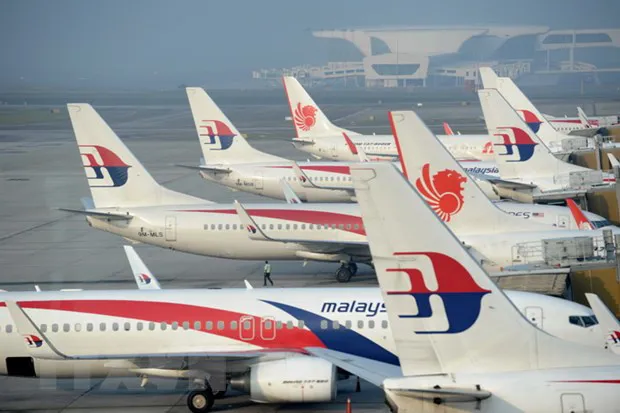Vietnam, Malaysia seek new air service agreement
The two sides also highlighted the expansion of high potential areas such as automation, smart logistics, innovation, high technology, digital economy, and digital transformation.
Vietnam and Malaysia will speed up the negotiations for a new agreement on Air Services that matters a lot to the two countries’ recovery plans in the post-pandemic period.
| Malaysia airlines. Photo: AFP/VNA |
The two governments’ leaders welcomed the mutual recognition of vaccine certificates, which will facilitate safe and regular commercial travel between both countries, according to the Joint Press Conference Statement released on March 21 during the ongoing visit paid to Vietnam by Malaysia’s Prime Minister Ismail Sabri bin Yaakob.
Flights are significant to the sustainable development of the economies in the time to come in the context that demand for travel between the two countries is rising thanks to Vietnam’s full border reopening on March 15 and Malaysia’s same move on April 1.
Regarding vaccine certificates, Vietnam has recognized those from Malaysia while it is waiting for the same recognition from Malaysian authorities.
In addition to the aforementioned issues, more measures were discussed between the two government leaders, including maintaining high-ranking exchange visits; reinforcing bilateral cooperation mechanisms namely the Joint Commission for Economic, Scientific and Technological Cooperation (JCM) and the Joint Trade Committee (JTC); effectively conducting the Plan of Action 2021-2025 for the implementation of the Strategic Partnership.
The leaders emphasized the importance of attaining the trade target of US$18 billion by 2025 through exploring ways to improve market access for key export products of both countries, including agriculture and aquaculture products, halal products, processed foods, electronic components and products.
In this regard, they agreed to take advantage of new trade agreements of which the two countries are members, including the Comprehensive and Progressive Agreement for Trans-Pacific Partnership (CPTPP) and Regional Comprehensive Economic Partnership (RCEP).
In terms of investment, they highlighted the expansion of high potential areas such as automation, smart logistics, innovation, high technology, digital economy, and digital transformation.
Last but not least, the leaders agreed to enhance information exchange and cooperation between the Navies and the Coast Guards of the two countries to effectively address emerging maritime issues. Both countries will strengthen maritime and ocean cooperation through prioritizing sustainable development of maritime economy, management of maritime resources, and protection of the marine environment.
Concerning regional and international cooperation, the two heads of government are committed to enhancing coordination on building ASEAN Community, including the ASEAN Community’s Post-2025 Vision with Malaysia as permanent coordinator. They expressed support for ASEAN’s active role in assisting Myanmar to overcome the current crisis and to return to normalcy, including the implementation of the Five-Point Consensus.
The leaders reiterated ASEAN’s consistent position on the South China Sea. They called for the full and effective implementation of the Declaration on the Conduct of Parties in the South China Sea (DOC) and the substantive negotiations towards the conclusion of the Code of Conduct in the South China Sea (COC).









